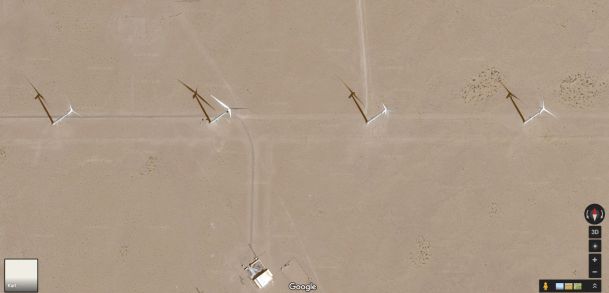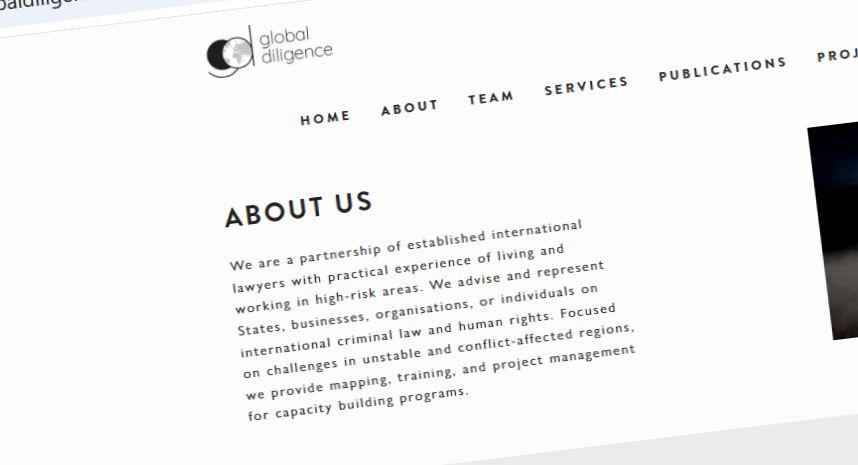
The Chinese company Envision Energy is going to supply Engie with the windmill components for its controversial windfarm near Dakhla in occupied Western Sahara.
Photo: In the horizon lies one of the plantations of ‘Les Domaines Agricoles’ (ex-Domaines Royaux), near Dakhla, occupied Western Sahara. The plantation, owned by the Moroccan king, will be one of the beneficiaries of Engie's desalination project - and a new windfarm - in the occupied territory. Photo @ElliLorz.
On 10 May, the Chinese company Envision Energy announced that it will be supplying 60 MW of wind turbines to the wind-powered desalination project that is co-owned by French energy giant Engie, and Nareva, the energy company of the king of Morocco.

Dakhla, located in the south of the three-quarters of Western Sahara that Morocco has illegally occupied since 1975, is home to several large Moroccan plantations and greenhouses that produce fruits and vegetables for export.
Morocco aims to increase the farmland by an additional 5,000 hectares, on top of the approximate 1,000 hectares that are currently being cultivated. As agriculture is highly water-intense in this desert landscape, the Moroccan government issued a tender for a desalination project - which Engie won in December 2018 after having joined forces with the Moroccan king's company Nareva.
The Dakhla desalination plant will have a capacity of 113,000 cubic metres a day associated with a 72 MW wind farm, according to Engie’s Universal Registration Document published in March 2023 [or download].
It would appear that at least 60 MW thereof will be supplied by the privately owned Shanghai-headquartered Envision Energy, which is reported to provide its EN171-5MW turbines for the project.
Engie had informed WSRW about its plans in early January 2021, in response to a letter from Western Sahara Resource Watch (WSRW). Engie then stated to WSRW that it had retained consultancy firm Global Diligence to “consult all stakeholders involved” in relation to the project. Global Diligence soon after invited WSRW to assist “in identifying and engaging with a broad range of the Project’s intended and potential beneficiaries on an ongoing basis”. Global Diligence would encourage those ‘stakeholders’ to “engage with us [Global Diligence] in a spirit of realism and compromise”.
WSRW informed Global Diligence that it declined to take part in such a process as it fails to comply with the basic legal principles that apply to Western Sahara, namely that the territory is separate and distinct from Morocco, that Morocco has no legal mandate to administer the territory, and that the people of the territory have a right to self-determination.
As stipulated by the EU Court of Justice and by several UN bodies, the people of Western Sahara have a right to consent. As far as WSRW can tell, they have never consented to Engie’s desalination project on behalf of the Moroccan government in their occupied land.
Global Diligence, paradoxically, works to document Russian human rights abuses in occupied Ukraine, while it carried out the confidential study for Moroccan government's business partner Engie in occupied Western Sahara without taking into account the right to self-determination of the Saharawi people.
WSRW last wrote Engie on 17 May 2021, asking about the operation, but the company has not yet responded. WSRW sent a reminder on 22 May 2023. Global Diligence did not answer any of WSRW's questions regarding their methodology, terms of reference, or assessment of legal facts pertaining to both the territory and its people. WSRW wrote Envision Energy on 17 May 2023.
Since you're here....
WSRW’s work is being read and used more than ever. We work totally independently and to a large extent voluntarily. Our work takes time, dedication and diligence. But we do it because we believe it matters – and we hope you do too. We look for more monthly donors to support our work. If you'd like to contribute to our work – 3€, 5€, 8€ monthly… what you can spare – the future of WSRW would be much more secure. You can set up a monthly donation to WSRW quickly here.
WSRW asks French ENGIE about business ethics
The French multinational ENGIE operates in occupied Western Sahara. WSRW today wrote the company, asking how they consider the legal-ethical aspects of such operations.
New controversial energy infrastructure to be built in Western Sahara
The Moroccan government has opened for a relatively large tender in Dakhla.
Global Diligence defends operations on occupied land
The legal advisory firm Global Diligence, which presents itself as expert on ‘heightened due diligence’, misrepresents international law in occupied Western Sahara.
New report: Western Sahara phosphate trade halved
The export of phosphate rock from occupied Western Sahara has never been lower than in 2019. This is revealed in the new WSRW report P for Plunder, published today.



